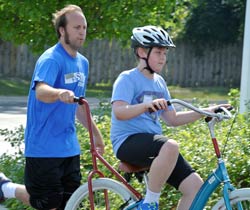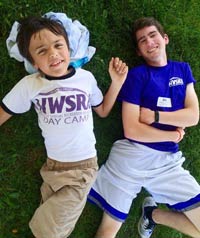
Managing Behavior Management Special Recreation Associations (SRAs) and park districts with therapeutic recreation departments serve participants with special needs, helping to improve their quality of life through a variety of activities, programs and events. But staff at these facilities face special challenges and risks, too.
“Staff must be able to recognize, defuse, or handle disruptive or dangerous behavior by participants,” advises Bill Hooker, PDRMA Training Program Supervisor, “and behavior management training is an essential tool to manage risk in these settings.”
 PDRMA encourages SRAs and other members offering therapeutic recreation programs to conduct an analysis of their agency-specific need and choose a behavioral management/conflict-resolution training program accordingly. One aspect of this analysis may be that of auditing a program presented by another SRA. Such training can prevent, minimize and/or reduce the likelihood of participant injury, staff injury and agency liability. PDRMA will address SRA risk management challenges and discuss its new behavioral management pilot training subsidy program during its Risk Management in the Special Recreation/Therapeutic Recreation Setting class on March 10. PDRMA encourages SRAs and other members offering therapeutic recreation programs to conduct an analysis of their agency-specific need and choose a behavioral management/conflict-resolution training program accordingly. One aspect of this analysis may be that of auditing a program presented by another SRA. Such training can prevent, minimize and/or reduce the likelihood of participant injury, staff injury and agency liability. PDRMA will address SRA risk management challenges and discuss its new behavioral management pilot training subsidy program during its Risk Management in the Special Recreation/Therapeutic Recreation Setting class on March 10.
The Handle with Care program Fox Valley SRA uses provides just what full-time and part-time staff need to know. “The training gave our staff the tools to react properly to certain situations that might occur if a participant is acting out verbally and/or physically,” explains Brian Houzenga, CTRS, Support Staff Manager. Key times for behavior management are when participants have difficulty transitioning from one activity to another. Although most disruptions are verbal, occasionally a participant requires physical intervention, a necessary last resort at Fox Valley SRA.
“Very rarely, a staff member encounters an acting-out participant who poses a serious safety threat to her, others (other staff, participants or patrons) or both,” explains Houzenga. “At that point, our employees use what they learn in Handle with Care training to ensure the safety and well-being of everyone in the program.”
 Houzenga notes staff feedback about the training is positive. “They feel that the physical holds they learn to use are very effective in preventing further disruptions in their programs. By keeping the individual who was acting out restrained, they can provide a safer environment for the other participants and staff.” Initial training typically lasts five-to-six hours, depending on the number of trainees; the refresher courses throughout the year last about three hours. Houzenga notes staff feedback about the training is positive. “They feel that the physical holds they learn to use are very effective in preventing further disruptions in their programs. By keeping the individual who was acting out restrained, they can provide a safer environment for the other participants and staff.” Initial training typically lasts five-to-six hours, depending on the number of trainees; the refresher courses throughout the year last about three hours.
“We hold a number of behavior management trainings throughout the year, so our staff has tools available to de-escalate a situation before it requires physical intervention,” he adds. “We also have behavior plans for specific participants we know have a difficult time in our programs.”
Ted Adatto, Inclusion Coordinator, Northwest Special Recreation Association (NWSRA), uses the Nonviolent Crisis Intervention Program from The Crisis Prevention Institute to train staff to handle the challenges of a large (15,000 registrants) and diverse (ages 2 to 90 years of age) group of participants.
 “Behavior is communication of a need,” says Adatto, “and can be expressed by anything from almost imperceptible anxiety to aggressive physical behaviors. The training teaches staff to assess behavior, identify behavior stages and choose the right response to de-escalate the situation and provide care to keep all participants, staff and the public safe. “Behavior is communication of a need,” says Adatto, “and can be expressed by anything from almost imperceptible anxiety to aggressive physical behaviors. The training teaches staff to assess behavior, identify behavior stages and choose the right response to de-escalate the situation and provide care to keep all participants, staff and the public safe.
“Staff feels much better and more confident as this training system can be applied to many different scenarios,” he adds. “Verbal de-escalation techniques are key, because it’s easy to get emotional in a situation and overreact, underreact or misjudge reactions. This training really breaks down the levels, so staff understands how to react appropriately.”
 Adatto himself undergoes several full days of training every two years and trains full- and part-time staff a minimum of eight to 16 class hours every year with refreshers available if needed. He also helped create a Behavior Crisis Team among the 17 park districts associated with NWSRA to streamline training and share information. “We have specific behavior teams to discuss individual cases and develop proactive strategies for potential situations.” Adatto himself undergoes several full days of training every two years and trains full- and part-time staff a minimum of eight to 16 class hours every year with refreshers available if needed. He also helped create a Behavior Crisis Team among the 17 park districts associated with NWSRA to streamline training and share information. “We have specific behavior teams to discuss individual cases and develop proactive strategies for potential situations.”
Click here to register for the March 10 Risk Management in the Special Recreation/Therapeutic Recreation Setting class or visit the PDRMA Training Calendar. |

